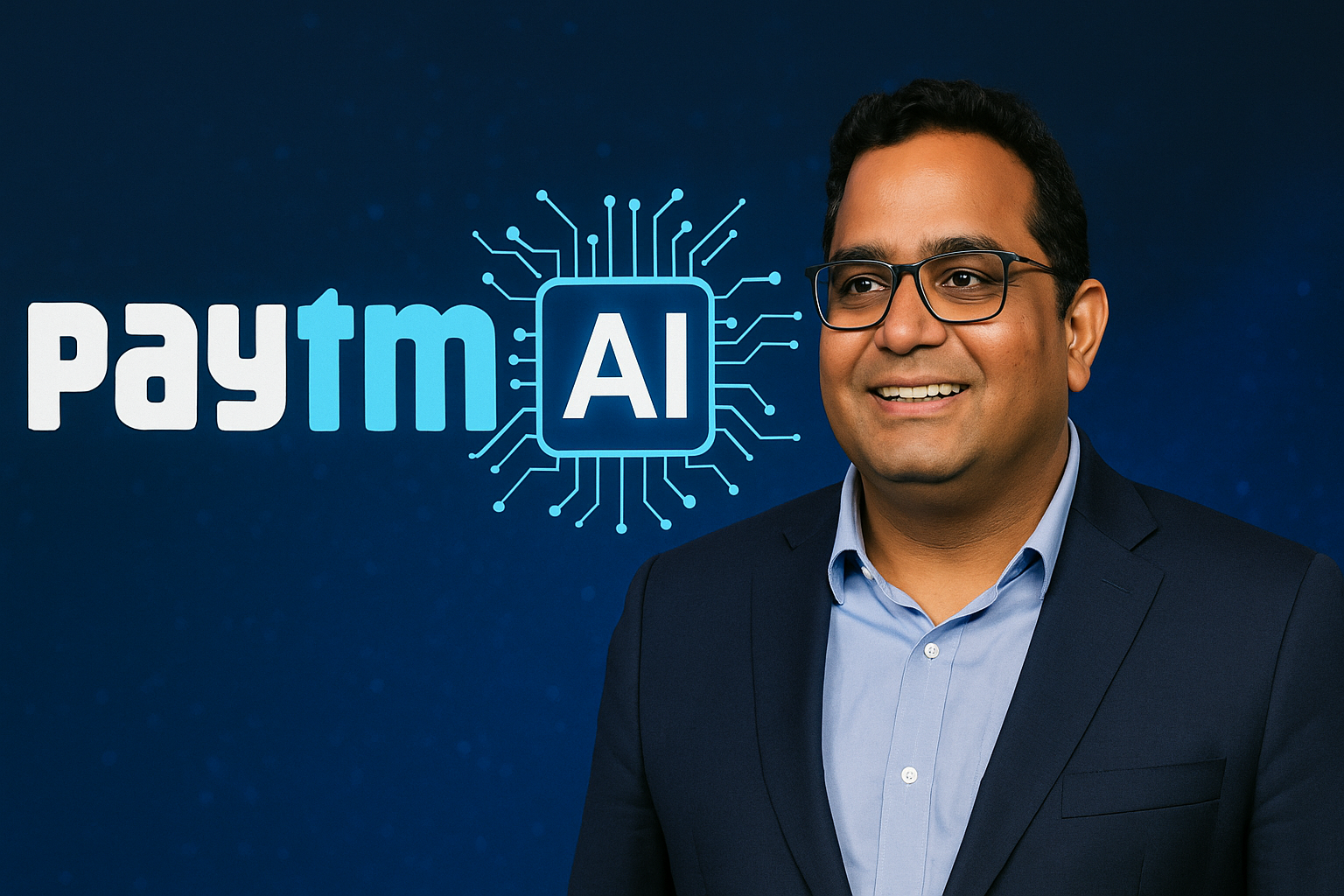Paytm is shifting its focus in a big way. The company is now building itself around artificial intelligence—not as a feature, but as a foundation. Speaking at the recent Shivir: AI Commerce Edition in Delhi, Paytm’s founder and CEO Vijay Shekhar Sharma shared that artificial intelligence will soon be central to how the company operates, thinks, and grows.
“Sooner or later, we’ll have to use AI as an employee—or even as a CFO,” Sharma said, making it clear that this transition is not a tech experiment but a full-scale change in mindset.
This statement marks a turning point in how one of India’s most well-known digital companies sees its future—leaner, faster, and more deeply automated.
A Reset After Restructuring
Earlier this year, Paytm made headlines for a different reason. The company let go of around 3,500 employees, largely from sales functions, after regulatory restrictions were imposed on Paytm Payments Bank by the Reserve Bank of India.
Rather than fill those roles the traditional way, Sharma’s approach is to rethink how work itself gets done. Artificial intelligence, he believes, can take over many of the repetitive, decision-heavy, or pattern-based tasks that currently depend on human input.
This includes everything from financial reporting and campaign management to customer support and in-app analytics.
The Rap Passbook: Data Meets Everyday Language
To show what this shift could look like in practice, Paytm is testing a new feature that turns user spending data into a custom rap song. Called the “AI-powered passbook,” the tool summarizes your monthly expenses through lyrics and rhythm. Users can even choose a genre.
For example, if you’ve spent on groceries, subscriptions, or fuel, the app could transform those patterns into short verses.
“It’s a fun way to engage users and help them make sense of their spending,” Sharma noted. The goal isn’t just novelty—it’s to create a more intuitive and emotionally engaging way to interact with personal finance data.
The feature is still in testing, but the concept itself reflects Paytm’s broader strategy: use AI not only for efficiency, but also for clarity and relevance.
Not Just Tools—A System-Wide Shift
This isn’t Paytm’s first step into AI. The company has already partnered with Perplexity AI to bring conversational search into its app. This allows users to ask questions in plain language—about transactions, offers, or settings—and get real-time answers without navigating menus.
What’s different now is the scale. Instead of adding AI in select places, the company wants to make it part of every workflow. Areas expected to be restructured using AI include:
- Real-time support and issue resolution
- Personalized dashboards and budget summaries
- Predictive marketing and campaign automation
- Risk modeling and financial decision-making
As Sharma sees it, AI won’t just support employees—it could become the logic layer of the organization itself.
India’s Role in Global AI: From Model-Building to Application
Sharma also addressed a larger point about India’s place in the global AI ecosystem. While much of the global focus is on building foundational models, he believes India’s edge lies in how AI can be applied—quickly, practically, and at scale.
“We don’t have to build the models. What we have is scale and problems that matter,” he said.
In Sharma’s view, India can become a global leader in AI application—using ready models from around the world and deploying them to solve high-volume, real-world challenges in areas like finance, agriculture, logistics, and healthcare.
What It Means for Indian Tech
Paytm’s shift reflects a wider trend. Companies are no longer just investing in digital—they’re rethinking the structure of their workforces, decision systems, and product development cycles.
Instead of adding more people to move faster, Paytm is betting on smaller teams powered by more intelligent systems. This could mean:
- More consistent decision-making
- Simpler user interfaces
- Faster product testing
- Lower overhead in areas like reporting and support
What started as a response to regulatory challenges may now become a blueprint for how modern fintech companies scale: with fewer people, sharper tools, and better feedback loops.
FAQs About Paytm’s AI-First Direction
What does it mean that Paytm is becoming an AI-first company?
Paytm is shifting its internal processes and user tools to rely more heavily on AI. This includes using artificial intelligence for decisions, support, marketing, and even financial operations—reducing dependency on manual tasks.
What is the AI-powered passbook feature?
It’s a feature that turns your monthly expense data into a short rap song. Users can choose a musical style, and AI generates lyrics based on categories like groceries or subscriptions. It’s designed to make financial insights easier to understand.
How is Paytm using AI today?
Paytm has already added conversational AI through a partnership with Perplexity. This lets users ask questions in plain English and receive quick, contextual responses. The company plans to expand this approach to other areas.
Why did Paytm reduce its workforce recently?
The layoffs—about 3,500 people—were part of a restructuring after RBI restrictions on Paytm Payments Bank. Many roles affected were in field sales. The move is aligned with Paytm’s transition toward more AI-led processes.
What is Sharma’s view on AI in India?
He believes India can lead the world in AI application, not model creation. The country’s scale and complexity make it ideal for real-world deployment of AI tools, especially in sectors like fintech and e-commerce.

